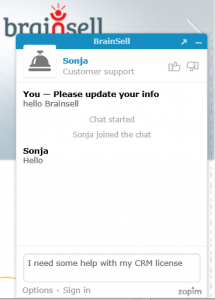Improve customer service using CRM: 4 tips
 Improve profit with customer service
Improve profit with customer service
- 68% of customers who leave do so because of poor customer service
- Acquiring a new customer costs six to seven times more than doing business with an existing customer.
Consequently, consumers demand very high customer service and businesses are recognizing the shift of power from the seller to the buyer. In order to manage your customer’s, the high expectations, your customer service teams need to leverage CRM to build long-lasting relationships and deliver exceptional customer experiences.
Here’s how:
1 – Collect customer data and keep in touch
The best CRM systems are an effective tool for gathering and organizing customer data from multiple touchpoints, and allow businesses to create more personal connections with their customers. Most CRM systems allow businesses to track and manage customer contact information, communications, purchase behavior, billing information, and more. Customer service representatives can use this data to gain a deeper understanding of who their customers are, what they like, and what will incentivize them to purchase, allowing them to personalize their communications to provide the right message to the right customer at the right time.
Customer service reps can also use CRM data to simply keep in touch with customers and let them know they are important. 80% of your sales likely come from 20% of your customers, so it is crucial to keep them engaged and happy so that they will want to spend more and refer your business to other potential customers. Merchants can do this by updating shoppers on company news, announcing sales and special offers, and even asking for feedback.
2 – Standardize processes for resolving cases
With a CRM, customer service representatives can create workflows to standardize their best practices for resolving cases and effectively collaborating with other divisions of the company. They can also use the email automation functionality to set up a corporate mailbox for support requests and automatically generate Cases. Businesses handle a large amount of communications per day, so this allows support teams to more efficiently handle incoming customer requests, create proper replies for different types of customer emails, and automatically turn requests and support tickets into Cases. With these processes set in place, customer service teams can increase productivity and spend more time nurturing customers and incentivizing them to buy more.
3 – Collect customer service tickets and provide quick responses

Customer service doesn’t always mean phone support
Businesses can integrate their CRM with customer service platforms, such as Zendesk, allowing reps to collect customer service tickets into customer account records using chat, phone or email. This enables customer service agents to provide faster and better support and easily flag issues by prioritizing support efforts based on the customer, the urgency of the issue, and the impact it might have on their business. Additionally, with a CRM, reps can further personalize the support experience by using video conferences and screen sharing options to visually walk customers through the issues they are facing. With the right strategy in place, customer support teams can efficiently tackle customer issues and effectively turn potentially difficult interactions into delightful customer experiences.
4 – Reward loyal customers
A good loyalty program has the power to transform your business. With the competition getting stronger, it is important to reward customers for choosing your brand and to keep them coming back. Businesses can use a CRM to see which customers are top customers based on how recently they purchased, how often they purchase, and how much they spend when they purchase, (i.e. RFM analysis). They can then reward these top customers with points, giveaways, and other concessions to show the customer they are valued.
CRM helps businesses obtain better insights so that they can make the right decisions for their customers. With the ability to track how your business is performing and how your customers are interacting with your brand, businesses can boost their approach to customer service and provide personalized customer experiences that keep their shoppers coming back.

Stay in the Loop
Subscribe to get all our latest content sent directly to your inbox!





